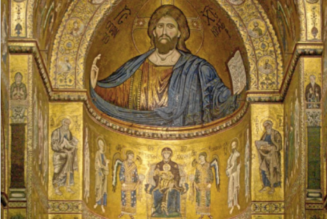By Fr. Jerry Pokorsky ( bio – articles – email ) | Sep 11, 2023
During the Last Supper, Jesus consecrates the wine at the first Mass, forever linking the Eucharist to forgiveness: “And he took a cup, and when he had given thanks he gave it to them, saying, ‘Drink of it, all of you; for this is my blood of the covenant, which is poured out for many for the forgiveness of sins.’” (Mt. 26:27-28)
Jesus provides a template for seeking reconciliation: “If your brother sins against you, go and tell him his fault, between you and him alone.” Present the evidence, and if he refuses to listen, escalate the matter to another witness or two and, if necessary, the Church (cf. Mt. 18:15-17).
He adds: “Truly, I say to you, whatever you bind on earth shall be bound in heaven, and whatever you loose on earth shall be loosed in heaven.” (Mt. 18:18) After the Resurrection, Jesus formalizes the Sacrament of Penance: “Receive the Holy Spirit. If you forgive the sins of any, they are forgiven; if you retain the sins of any, they are retained.” (Jn. 20:21-22). The Sacrament of Penance provides us with the great gift of certainty.
Sin disfigures our souls with evil and calls forth God’s just punishments. Our repentance—and God’s forgiveness—eliminates guilt and diminishes punishment (above all, the fires of hell). But a residual of punishment remains for reparation. Sin is like carelessly dropping a glass of water. After the initial cleanup, the sharp shards remain for weeks.
Sins are not feelings. A mother doesn’t have to like to change diapers but only sins when she refuses her duty to change them. Sins are actions: thoughts, words, and deeds that violate the Ten Commandments as fulfilled in Jesus and presented to us by the Church in her traditional teachings. “If you love me, you will keep my commandments.” (Jn.14:15) We are accountable for sins when we know our choices are evil and freely consent to them.
Our sinful choices are either venial or mortal. “All wrongdoing is sin, but there is sin which is not mortal.” (1 Jn. 5:17) Venial sin tarnishes and weakens the soul. Mortal sin kills the soul and deprives us of the graces for salvation. God grants forgiveness when: 1) our actions are contrary to His will. 2) We repent of our disobedience. 3) We resolve to do penance in satisfaction for our sins, and 4) We resolve to avoid sin in the future.
Jesus provides a thumbnail sketch of a healthy examination of conscience: “What comes out of a man is what defiles a man. For from within, out of the heart of man, come evil thoughts, fornication, theft, murder, adultery, coveting, wickedness, deceit, licentiousness, envy, slander, pride, foolishness. All these evil things come from within, and they defile a man.” (Mk. 7:21-23)
Examples of mortal sin also include missing Mass on Sunday without sufficient reason, acts of hatred, blasphemy, unworthily receiving Communion, participating in or encouraging an abortion, contraception, mutilations, detraction, grievous lies, shoplifting, viewing pornography, and the various external sins against chastity.
Typical examples of less grievous sins are deliberate acts of impatience, pettiness, gossip, uncharitable comments, impure glances, rudeness, and disobedience to lawful authorities.
Perfect contrition regrets offending a loving God. “There is no fear in love, but perfect love casts out fear.” (1 Jn. 4:17) God forgives sin outside Confession with perfect contrition. In the tangle of our minds, we cannot be sure we’ve attained that threshold. But we are aware of imperfect contrition: fear of just punishment. According to Saint Thomas, the graces of the Sacrament of Penance raise our good but inferior imperfect contrition to perfection. The graces of the Sacrament provide the blessed confidence of pardon.
The Church encourages anonymity and requires security in the confessional. Under ordinary circumstances, the priest cannot see us, separated by a screen. By the graces of Holy Orders – not his merits or spiritual state—the priest represents Jesus Himself. The Church binds the priest with the inviolable Seal of Confession (Can. 983). The Seal cannot be violated under pain of automatic excommunication (Can. 1386).
Confession is the only place in the world where we articulate our sins in secret and receive forgiveness with certainty. We begin with the Sign of the Cross. We tell the priest when we last confessed our sins. Every good Confession includes, to the best of one’s ability, all of the mortal sins – nature and number—leaving the details to God. (If a penitent forgets a mortal sin in good faith, the absolution forgives the sin. Try to confess the forgotten transgression without drama next time.) A confession that does not include mortal sins is “devotional.”
Most confessions are brief, separating Confession from spiritual direction. The priest usually responds with words of encouragement. Within reason, one may take the opportunity to ask for spiritual advice.
The priest usually assigns a practical penance for recitation afterward. Indeed, one Hail Mary will do for the worst of sins. Penance not only acknowledges the need to make amends; completing our penance is also a sign of a willingness for ongoing reparation. In God’s justice, Purgatory is the spiritual finishing school, if necessary.
The penitent responds with the recitation of the Act of Contrition. There are several forms, and the priest can help.
As the penitent responds with the Sign of the Cross, the priest concludes with these essential words: “…I absolve you from your sins, in the name of the Father, and of the Son, and of the Holy Spirit.” When repentance meets the absolution from even the most unworthy priests, Jesus forgives all sins.
A good Confession gives us the consoling hope and assurance that if we die today, we will enter His heavenly glory—although we may need to spend time in Purgatory. (God lavishes grace upon us, but grace isn’t cheap.) The sense of certainty that comes with the forgiveness of sins is the cause of our joy and is the reason for our Eucharistic thanksgiving.
Sound Off! CatholicCulture.org supporters weigh in.
All comments are moderated. To lighten our editing burden, only current donors are allowed to Sound Off. If you are a current donor, log in to see the comment form; otherwise please support our work, and Sound Off!

There are no comments yet for this item.





![Following UK Prime Minister Boris Johnson’s Catholic wedding, the task of announcing new Anglican bishops will fall to someone else [London Times paywall]…](https://salvationprosperity.net/wp-content/uploads/2021/06/following-uk-prime-minister-boris-johnsons-catholic-wedding-the-task-of-announcing-new-anglican-bishops-will-fall-to-someone-else-london-times-paywall-scaled-327x219.jpg)




